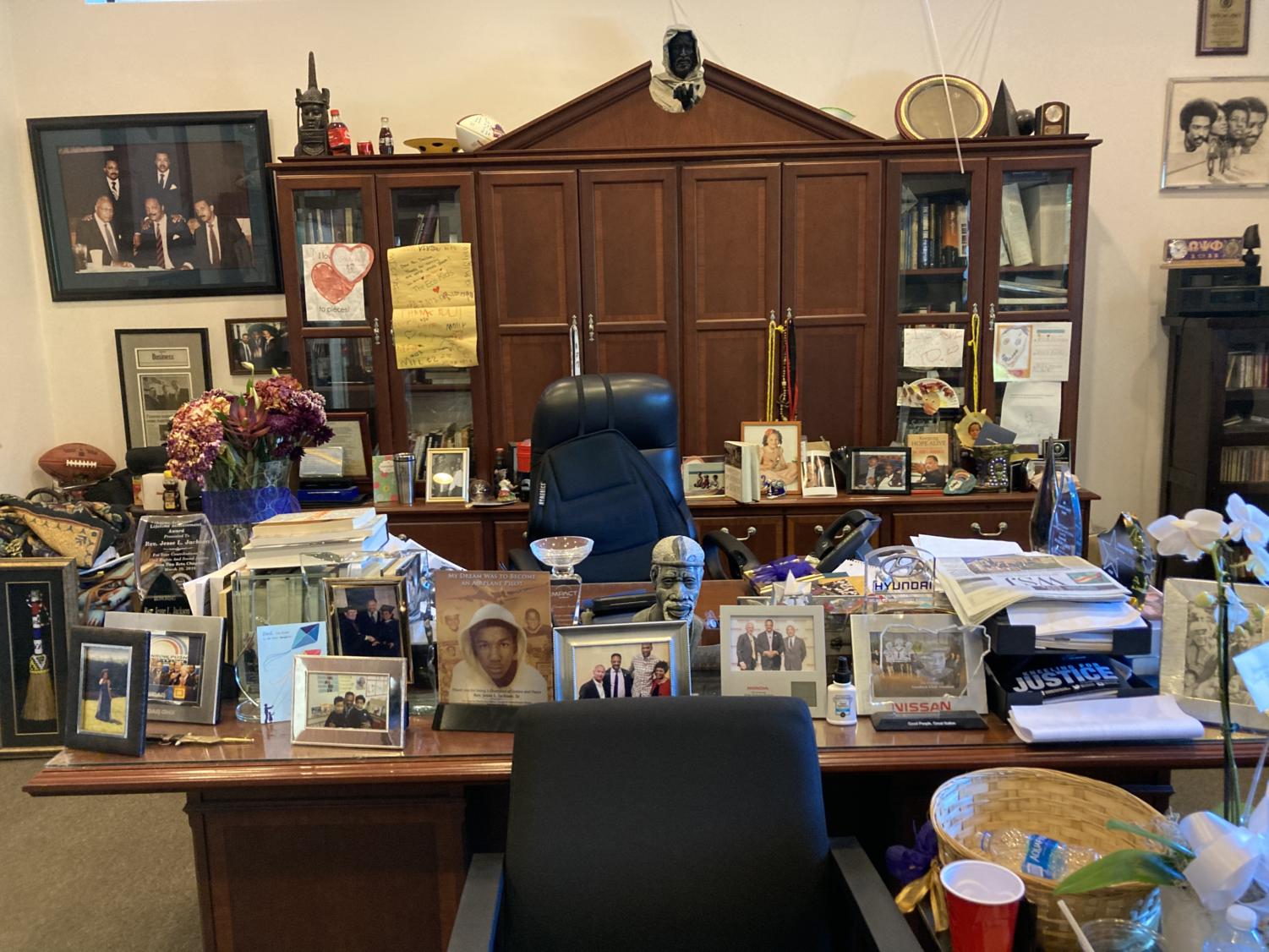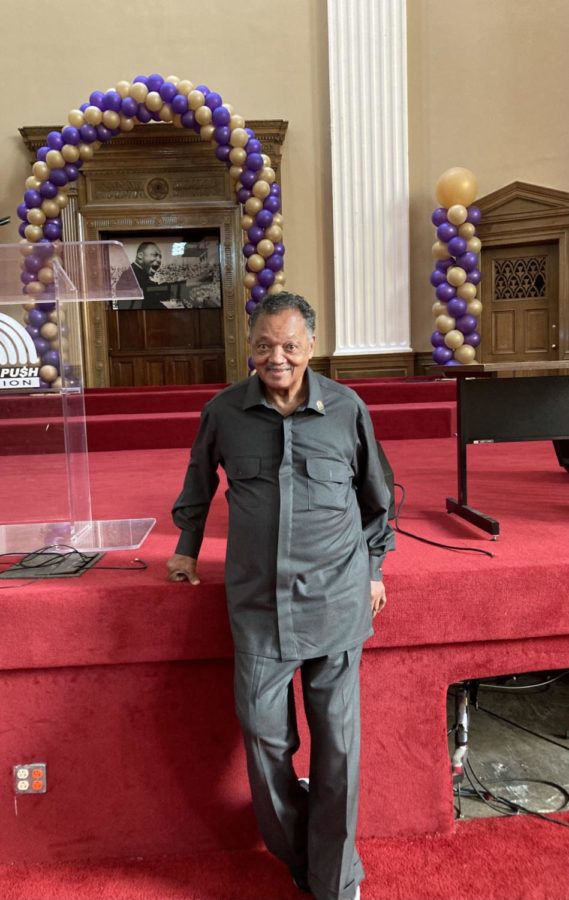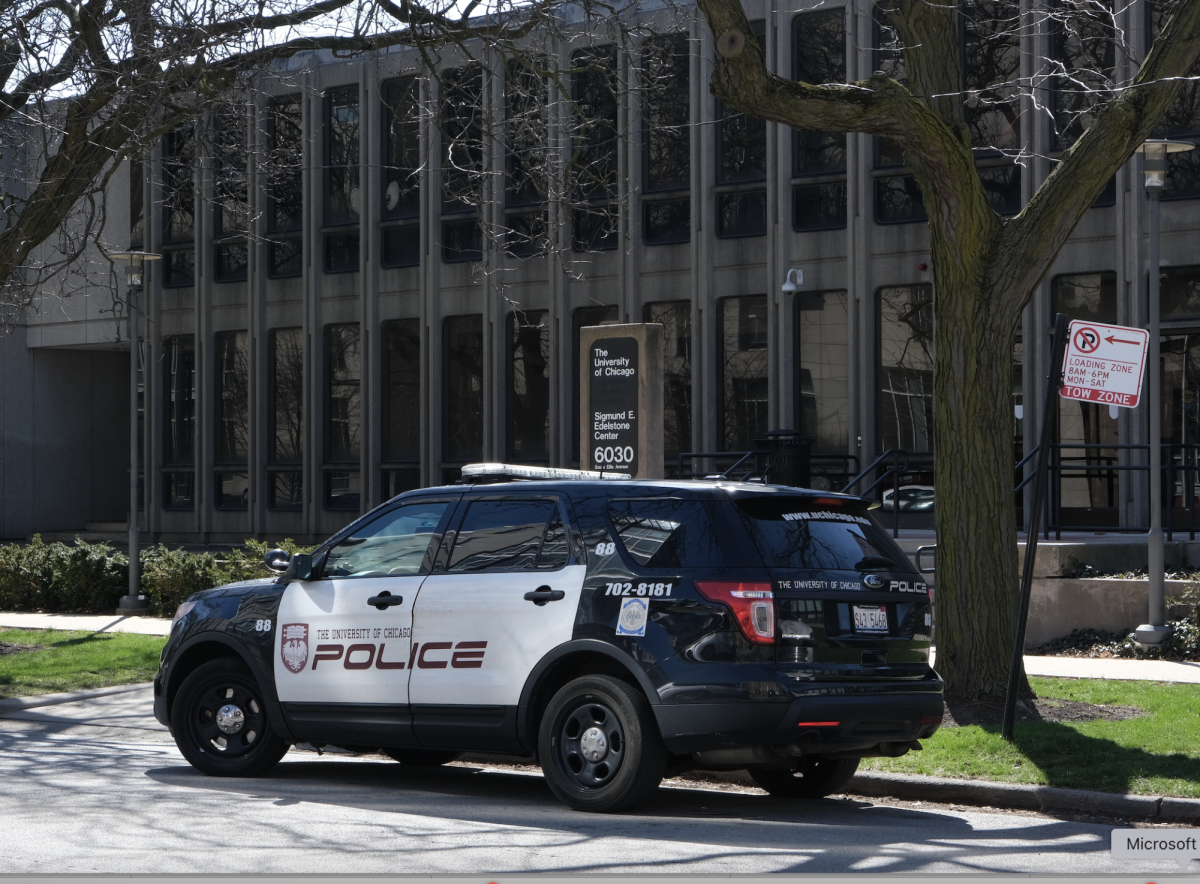When the Reverend Jesse Jackson travels around Hyde Park, he attracts notice. Our Sunday morning meeting over brunch at the Sophy Hotel is punctuated by people coming over to hug him, gushing and posing for selfies. One young woman shares the name of her godfather, whom Jackson knows personally, and he holds her hands and smiles while she recounts updates about mutual friends and asks about the ongoing work of Jackson’s organization, the Rainbow PUSH Coalition. As we leave the Sophy for Rainbow PUSH’s East 50th Street headquarters, a couple shyly asks him to take pictures with their two young daughters, who giggle and squirm as they hug him and smile for a cell phone camera.
Jackson, who turned 80 in October, has been embedded in Chicago civil rights work for half a century. Born in South Carolina, Jackson became involved in the civil rights movement while in college and was one of eight students who participated in a sit-in at the segregated Greenville Public Library. Famously a mentee of Martin Luther King Jr., he helped to found the Chicago branch of Operation Breadbasket, the economic arm of King’s Southern Christian Leadership Conference (SCLC). After King’s death, Jackson founded the Chicago-based People United to Save Humanity (PUSH), which has operated out of its headquarters at East 50th Street and South Drexel Avenue since 1972. In the late 1990s, PUSH became the Rainbow PUSH Coalition after merging with Jackson’s national Rainbow Coalition campaign for minority rights, women’s rights, and LGBTQ+ rights. He ran for president twice in the 1980s and served from 1991 to 1997 as “shadow senator” for Washington, D.C., an unpaid position that he used to lobby for D.C. statehood. In short, Jackson is a giant, one of a dwindling number of last century’s civil rights champions still alive and working to shape the next generation’s fight for racial justice.
He reached out to me in October, offering to sit down for a profile as part of his effort to educate students in Chicago about PUSH’s current priorities. We met twice, once on background and once on the record. Over the course of several hours, Jackson and I spoke about the issues on his mind lately, the hope he has for youth engagement in politics, and the impact his Parkinson’s disease has had on his work.
After leaving the Sophy, we drive through north Hyde Park in a hulking SUV outfitted with tinted windows and speakers on each of the doors, accompanied by the half-dozen PUSH staff members who joined us for breakfast. Jackson points out the sanctums of notable Hyde Parkers, from the Obamas to the investor John W. Rogers Jr., as we go. He tells me about his order at Valois—scrambled eggs, grits and bacon, and sometimes oatmeal with raisins and bananas—and insists it’s still the best breakfast in Hyde Park.
It was at Valois that Jackson met Mylon Patton, a University of Chicago fourth-year who now serves as his intern, sometimes advisor, and personal aide. Patton is of medium height with a ready smile and seems at home in business casual outfits—sneakers, slacks, and a button-down. Soft-spoken, polite, and unmistakably ambitious, he is eager to talk about his work and aspirations. Jackson jokes with him constantly—”Mylon thinks he’s the boss of me,” he whispers to me when Patton suggests a change of schedule—but also speaks with an almost fatherly affection about the young man. When I ask about Mylon’s future plans, Jackson laughs and says, “He’ll be senator, president—whatever he wants.”
In our interview, Patton also serves as an interpreter for Jackson, who was diagnosed with Parkinson’s in 2017. Jackson’s speech can be hard to make out, and Patton sits with us, helping me understand his answers.
Jackson starts our conversation by bringing up the death of Jelani Day, a 25-year-old Black ISU graduate student who was reported missing from Bloomington, Illinois, on August 25. Day’s body was discovered in the Illinois River in Peru, Illinois, on September 4 but was not positively identified until late September. Jackson recounts grim details of the state of Day’s body that he considers suspicious—Day’s organs were decayed and his cell phone was found miles from the scene. Since Jackson and I spoke, Day’s case has not been resolved, although on December 13, the Federal Bureau of Investigation announced that it was offering a $10,000 reward for “substantial information” about Day’s disappearance and death, which Day’s mother, Carmen Bolden Day, called “a publicity stunt.” She told NBC 5 Chicago, “They want to act like they’re doing something. I want them to do something.”
Although Day’s death was ruled a drowning, Bolden Day and Jackson have been outspoken about their belief that he was murdered in a racially motivated hate crime. In a statement, Bolden Day said “my son did not put himself in a river.”
Jackson sees Day’s death as another entry in the long record of violence against Black Americans. He says that Peru has a reputation as a “modern-day sundown town” and calls Day’s death an “Emmett Till–type case.” Jackson has been in touch with Bolden Day and, when we spoke, was in the process of pushing for more visibility for the case in hope of inciting action from the state’s attorney and governor to investigate the death further.
Jackson is also critical of how local police have handled the Day case, a concern paralleled in his criticism of Chicago police. “All of us have to earn our reputations. The police have not earned a good reputation,” he says. “Police everywhere have a sworn duty to protect and serve. If the police can protect and serve, we want them. The problem is when they are abusive and reactionary.” Jackson also criticizes the “blue wall of silence” that prevents officers from exposing misconduct in their ranks and says that one thing private and public police have in common is that they protect their own.
But while he has vocally supported Black Lives Matter and advocated for police demilitarization and an end to qualified immunity, Jackson has not publicly addressed activists’ calls for an end to policing entirely. When I ask about it, he is hesitant, saying that police occupation and abolition are two opposite extremes and that police are necessary because of the prevalence of gun violence in Chicago and elsewhere. Jackson says violence in Chicago has only expanded in the six years since his last major push on the issue, a campaign against gun violence in 2015. He says that Chicago’s gun culture started with the making of gangsters like Al Capone into cultural icons and that it is fueled by the accessibility of guns just outside the city. “Police need guns,” he says, because people have guns.
While Jackson may not himself endorse the calls for police abolition popular among young activists, he’s also not interested in telling students what to think. “Students should set their own agenda,” he says, stressing that young people are worried about the right things—canceling and avoiding debt, protecting the environment, expanding access to health care, preventing police violence, and safeguarding voting rights. What he most wants is more political engagement from today’s young people, who he says should “cross the high school stage with a diploma in one hand and their voter registration in the other.” Patton, Jackson’s apparent right-hand man, is Rainbow PUSH’s only intern from the University, a fact that frustrates both of them. Jackson says he wants students to use the organization as a place to gain experience on the ground and develop skills they can bring back to their communities and implement as future leaders. “My job,” he tells me, looking out his window, “is to teach students their power.”
He is most animated when talking about the role of youth in political progress – he spends several minutes recounting the key roles student activists have played in historical racial justice campaigns, from European teenagers who called for the abolition of slavery to college and high school students’ involvement in the civil rights movements of the 1960s. Young people, he says, “move on a moral agenda, often with more directionality than broader movements. When students come alive, it energizes the whole country.”
Watching Jackson recount history, it’s hard to forget that he himself is very much a part of it. We leave the Sophy and enter Rainbow PUSH. Nestled in the Hyde Park–Kenwood area, the building is something of a chimera: The west-facing facade is in a stately Greek style with eight sturdy columns and huge block letters that read, “Operation PUSH • National Headquarters • Dr. King’s Workshop.” The rest of the building is in a more modern style, with a layout something like that of a midsize high school—the spacious lobby tapers into a maze of hallways, and linoleum floors and beige paint add to the effect.
“[Nelson] Mandela walked through those doors,” Jackson tells me in a casual tone of voice as we enter the building. Everywhere you turn, there seems to be a reminder of the civil rights greats who have walked the streets of the South Side and the halls of PUSH’s headquarters. A huge poster board features dozens of pictures of movement leaders, many of which are signed in orange markers by figures who have come through the building and recognized themselves on the wall.
The hallways leading to Jackson’s personal office are lined with conference rooms and recording studios for Jackson’s frequent radio and podcast appearances. Each room is named for prominent figures in the history of the civil rights movement—Rosa Parks, Emmett Till, the Little Rock Nine, and others. Framed photos of Jackson smiling next to recognizable faces, from Michael Jackson to Bill Clinton, paper the walls. His office itself is large and sunny, with a north-facing window that Jackson likes to stand in front of, gazing out at the neighborhood. The room is filled with a career’s worth of ephemera: cards from elementary school students and pictures of Jackson’s own children, an honorary Harlem Globetrotter’s Jersey, signed sports balls of every variety, several orchids (real and fake), a carved wooden horse the size of a Doberman pinscher, and a battered fireman’s helmet given to Jackson to thank him for his long-standing support of Chicago’s Black firefighters.

It’s clear that these days, the urgency of activating the next generation weighs especially heavy on Jackson’s mind. His Parkinson’s makes it difficult for him to eat or move around without help from his staff. Jackson tells me that he first put words to emerging symptoms after a jogging injury sent him to his doctor, who gave him the diagnosis.
Parkinson’s, a progressive disease of the central nervous system, predominantly impacts movement but can also affect cognitive function in its late stages. Today, Jackson is especially cautious about his health, taking medicine four times a day to slow the disease’s progression. When he caught COVID-19 in the fall, doctors at his rehabilitation center told him that had he not been vaccinated, he likely would have died. But when I ask him how Parkinson’s has changed his work, he seems mildly surprised at the question. “You can sit around all day and do nothing, or you can keep doing the work. I’m fighting it by working,” he says. “I’m doing what I’ve always done, but slower.”
Although Parkinson’s can make Jackson’s speech difficult to understand, he still speaks in eminently quotable sound bites—delivered with the cadence and charisma of someone who has twice run for president. “Strong minds bring strong change,” he tells me, and later, “Leadership cannot just react. Leadership must demand, operating from a vision for the future.” On his bids for the national office in 1984 and 1988, he says he was running not to win but to “protest against liberalism,” which he describes as having been morally corrupt at the time. This bold statement underscores a key tension of Jackson’s career: his dual role as a risk-taking activist and a calculating politician.
He has been arrested countless times while fighting for civil rights and was an early and outspoken advocate for progressive causes like gay rights, ending the war on drugs, and national health care. In many ways, Jesse Jackson has lived the life of a rabble-rouser, someone who speaks out for his beliefs no matter the odds or personal risk involved. But at the same time, Jackson has long been denounced as overly ambitious, too focused on personal gain to serve the movement. King himself criticized Jackson, who he worried was too self-oriented to be a part of the SCLC’s collectivist vision. Although the two reconciled prior to King’s assassination, for which Jackson was present, Jackson was suspended from his role as the director of the SCLC’s Operation Breadbasket after King’s death. He formally resigned and shortly afterward founded PUSH, which began operations in Hyde Park.
But King’s criticisms were made more than 50 years ago, and in some ways, it feels unfair that the public narrative about Jackson has not moved on especially since King’s words cannot possibly reflect how the two men’s relationship might have evolved had he not been assassinated. The signage on the building’s façade still pays homage to King, and he is omnipresent inside the building in portraits, photographs, and cardboard cutouts.
At times in our interview, I felt I could see how the alleged politicking that marked Jackson’s early career has grown into a powerful impulse for strategic bridge-building. When I ask him about Mayor Lori Lightfoot, a polarizing figure among many progressives, he is quick to compliment her. “Lightfoot is a good mayor,” he says, praising her work on immigration, public education, and police accountability and adding that he hopes voters give Lightfoot the benefit of the doubt as she governs a city famous for its history of corruption. “She’s not building a machine. She’s been fair and open.”
Simultaneously, Patton tells me later that Jackson has been frustrated by Lightfoot’s public arguments with State’s Attorney Kim Foxx over a recent incidence of gang violence. He feels that elected officials’ fighting in the media gives an impression of fractured relationships and threatens residents’ faith in their government, and Patton says Jackson has been urging the two to reconcile. Reflected in this desire for unity and in his deference to the political agenda of the next generation is a Jesse Jackson who badly wants the left to win and believes that winning comes from working together.
And Jackson’s kindness seems genuine. It may be that he is more inclined to greet strangers with hugs and personal inquiries with a reporter watching, but I don’t think that is the case. When a woman wheeling her grandchild in a stroller stops us outside his headquarters, telling Jackson, “I’m so glad to see you. I’m so glad they’re taking care of you,” it is obvious that to people in Hyde Park, he is not just a beloved neighbor but also a symbol of the legacy of the civil rights movement. And chief in my mind as I wrote this profile was the fact that Jesse Jackson, who has been written about at length in national papers of record, chose to spend his Sunday with a 21-year-old student journalist writing for a college paper.
Whatever you think of Jackson’s legacy, one thing is clear; it’s not done being written. For him, “slowing down” means something very different than it might to you or me. During our first meeting—an off-the-record breakfast—he was coming from a birthday celebration and a meeting with the Chicago City Council and the Office of the Mayor. The second time, he arrived from recording a morning radio show and left our interview to attend a Chicago Sky game. And most recently, he made national news for attending the trial for the murder of Ahmaud Arbery, the Black jogger who was killed by three white men in Georgia in February 2020. The defense attorney for one of the accused men asked the judge to remove Jackson from the courtroom, repeating the complaint he had made about Al Sharpton’s attendance the week prior, when he said he didn’t want “any more Black pastors” present for the proceedings. All three men were ultimately convicted.
At the end of our conversation, Jackson turned the conversation back to Jelani Day. He compared it to the recent, widely publicized murder of travel influencer Gabby Petito, saying that Day’s case has been underreported by the media and insufficiently investigated by authorities. “Carmen has not yet buried her son,” Jackson says, “but the case has been buried.” A few days after our conversation, he traveled to Day’s birthplace in Danville to participate in his burial service at the family’s request. “We’re going to make the case to the people in power because that’s what we do,” he tells me about the forthcoming trip. “We get involved to get people in motion. That’s the mission: defend, protect, and gain human rights at home and around the world.”
This seems to be the heart of Jackson’s current work: using his international profile to talk about the issues that feel most pressing to him. And when he talks about those issues, it is in the voice of a minister who still preaches almost every Sunday. In explaining his attitude toward work in the wake of his diagnosis, he paraphrases the Book of Matthew: “Seek ye first the kingdom of God, and the rest will be added upon. Do the right thing first, for the right reasons, and the rest follows.”









